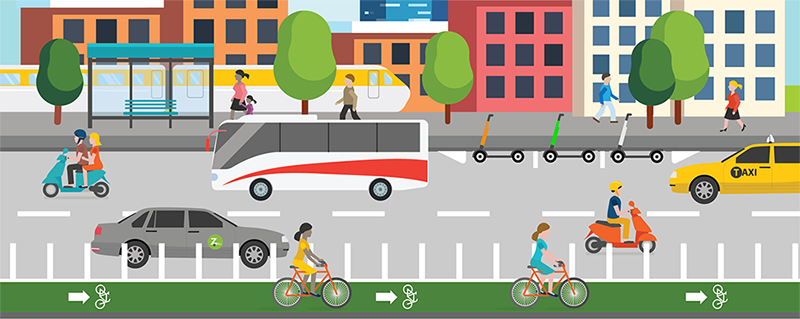Welcome to the Shared-Use Mobility Center’s weekly guide to the most impactful news, thought-provoking articles and innovative technologies that are shaping our transportation future. We believe in sharing information, just like sharing cars, bikes, and scooters, so if there’s anything additional you’d like to see, just drop us a line.
SUMC News and Announcements
SUMC In the News
Hello Friends,
2021 has given us the chance to reassess how we can best support our mission and our public. After much thought, we have decided not to hold a virtual 2021 National Shared Mobility Summit in April. We will without a doubt deliver the value you expect from our summit this year, and are exploring new and better ways to do this safely and virtually. By listening to the feedback from past summit attendees and the experiences of others, we are looking at new formats to maximize what you appreciate about our event—the relevant and cross-sector panel discussions, enlightening speakers, networking opportunities, and hands-on sessions and workshops—while keeping your attention and respecting your time. And just wait for 2022! COVID-willing, we will be back with an in-person National Shared Mobility Summit we can all look forward to. Stay tuned!
Join us at our first virtual event of 2021:
Transportation Inflection Reflection
February 17, 2021
8:30 am – 9:30 am PT | 10:30 am – 11:30 am CT | 11:30 am – 12:30 pm ET
This one-hour virtual event features a panel discussion moderated by our new CEO, Benjie de la Peña, and four important voices and thought leaders who will share their insights on the deep, systemic changes that are happening and need to happen to push the transportation system towards sustainability and equity.
Panelists include:
Stefanie Brodie
Research Practice Lead
Toole Design
Adonia Lugo
Interim Chair of the MA in Urban Sustainability
Antioch University Los Angeles
New Report from SUMC Founder-in-Residence Sharon Feigon and TRB’s Mobility Management Committee
The Transportation Research Board’s (TRB) Mobility Management consensus committee just released its report on how transit can integrate better with shared mobility services, a timely topic given the extent to which transportation services have been affected by COVID-19. The report is available for download in a PDF format on the National Academies site.
Free course on creating better cities from NUMO and MIT starts 1/19
Developed by the Massachusetts Institute of Technology and the New Urban Mobility Alliance, Leveraging Urban Mobility Disruptions to Create Better Cities is a ten-week, free edX course that brings together some of the world’s preeminent transportation scholars, urban planners, entrepreneurs, and community advocates to understand the challenges and explore the opportunities of the urban mobility revolution through a global perspective and with a focus on racial equity, sustainability, and accessibility. The course begins on January 19, 2021. Learn more and register.
Webinar: How LA Metro is Revolutionizing Their Transit Network with Microtransit on 1/26
Founder-in-Residence Sharon Feigon moderates this discussion with Metro Micro Project Manager, Rani Narula-Woods and RideCo CEO, Prem Gururajan about the development of the Micro Metro project. 3 years in the making, Micro Metro is an on-demand, ride-share service using vehicles operated by L.A. Metro in select zones. Register here.
TRB Attendees: SUMC Director of Research and Consulting Colin Murphy is moderating a session on Scooters. Session 1259 – Scooter Regulation: Past, Present and Future will be held on January 27 from 10:00 am – 11:30 am ET.
Mobility Justice
A $10 billion program to make amends? A proposed economic justice bill would upend urban highways in city cores and reinvest in the surrounding communities—and start by engaging residents on how to best use the free space.
Instead of hiring police officers, San Francisco’s BART is hiring social workers (and crisis intervention specialists) to respond social and civilian issues throughout the city’s transit network.
A $100 million fund, established by Morgan Stanley and National Equity Fund, will help preserve affordable housing options in Atlanta that fall within a one-mile radius of MARTA train stations—creating equitable, transit-oriented development resources for the metro.
Boston City Council member and mayoral candidate Michelle Wu makes the case for free public transportation, highlighting how the pandemic has exacerbated “pre-existing transit inequities” that harm low-income communities, people of color, and those living with disabilities.
Ridehailing/Carsharing/Carpooling
Read about the downward spiral of the taxi industry, which has been amplified by the ongoing pandemic, and how immigrant taxi drivers throughout New York have formed community bonds to navigate the ever-evolving taxi medallion landscape.
Uber is expanding its Uber Green initiative with 1,400 additional cities/towns in North America that will offer hybrid or electric car rides, an EV rental program for drivers, and in-app public transit options for 12 global cities.
The Rocky Mountain Institute has released a new insight brief that stresses the importance of ridehailing electrification to meet emissions reduction goals and analyzes industry barriers to widespread EV adoption in North American markets.
European ridehailing company Bolt wants to help people in London get the Covid-19 vaccine by offering £250,000 in rides to the UK government and NHS London to transport people to vaccine hubs around the city.
Bikesharing and Micromobility
Active transportation has health, equity, and sustainability benefits, but funding walking and biking projects can be a challenge. Enter the Active Transportation Alliance with a roundup of funding sources and program details in Illinois.
Here’s a new solution to first- and last-mile problems: think vertical. Such an approach was spearheaded by Vertical Vigo, a program to reconnect neighborhoods in Vigo, Spain with public elevators, escalators, and electric walkways.
The North American Bikeshare Association has a new set of guidelines and good practices to help municipalities learn about and contextualize the General Bikeshare Feed Specification so that it informs focused development for micromobility services and networks.
A friendly—but crucial—reminder from the folks at Streetsblog California: bike lanes make streets safer for all road users, including drivers and pedestrians. How so? Simply put: slower traffic = fewer fatal incidents (according to a 2019 study at least).
Transit
$13.27 billion is making its way to large and small urban regions, along with $678.2 million to rural and tribal areas and $50 million to ADA-accessible mobility options according to the Federal Transit Administration’s latest announcement on the allocation of the Covid-19 relief package.
Also on the aid front, about $486 million in federal assistance is coming to help Chicago transit thanks to the valiant efforts of local organizations and transit advocates, and it is to be allocated in a “data-driven, transparent, and collaborative process”, but there is more to be done to secure the region’s mobility future.
Like many other areas adapting to current pandemic dynamics, Benzie County, MI responded to the crisis by using their transit network to provide essential services to those in need. Read how residents now have access to prescription deliveries, food bank supplies, transit trips, community connections, and more on The Detroit News.
The Massachusetts Community Transit Grant program will administer $8.6 million to cities, towns, and nonprofits that will be used for “transit operating costs, mobility management or new capital investments,” to expand mobility options for seniors and people with disabilities.
Technology
The Federal Highway Administration is awarding $49.6 million to 10 projects to develop intelligent transportation systems that will boost street safety, relieve congestion, and enhance vehicle connectivity as well as provide support for autonomous vehicle tech.
General Motors is going all-in on electric vehicle delivery with the automaker’s latest business unit called BrightDrop, announced at the virtual 2021 CES, which highlights smart EV delivery vans and pod-like, connected, “propulsion-assisted” EV pallets aimed at commercial clients like FedEx.
Bogotá is on the move to electrify transit with 1,002 new EV buses on order, the largest for pure-electric buses outside of China and a substantial effort to reduce GHG emissions in the metro.
Developed and created by the Automotive Research & Testing Center in Taiwan, the electric, self-driving WinBus shuttle has gained a one-year license for experimental operations after successfully completing a 12.3-km fixed-route test last year.
Sustainability
Sweden is looking into a hyperlocal version of the 15-minute-city that allows residents to be architects of their own streets and determine which amenities are within a one-minute stroll. CityLab explores this ‘One-Minute City’ plan and how it engages residents to be champions of their environments.
“We consider housing for automobiles a necessity that, by law, everybody must subsidize, while housing for people is optional…”. Read Planetizen’s latest deep dive into how affordable housing solves space inefficiency issues stemming from the overabundance of parking in the US.
Reaching an electrified transportation future will take bold policy action and state-wide initiatives that tie infrastructure needs with recent innovations in the EV market—according to Sam Schwartz’s latest post that evaluates how we can effectively transition to zero-emission vehicles.
SUVs and large vehicles could see stronger safety regulations and restrictions to keep pedestrians and cyclists safe if the USDOT’s latest Pedestrian Safety Action Plan follows through with included updates to the aging New Car Assessment Program.
Requests for Proposals, Inquiries, and Information
SUMC is hiring!
We’re looking for a temporary bookkeeping and administrative assistant with long-term potential.
RFP: Complete Streets Concept
Mid-America Regional Council
Westwood, KS
Deadline: January 29, 2021
Complete Streets Study
Mid-America Regional Council
Merriam, KS
Deadline: January 29, 2021
RFP: Paratransit Management Services
Pioneer Valley Transit Authority
Springfield, MA
Deadline: February 5, 2021
Did someone forward this to you? Sign up for our newsletter here.







